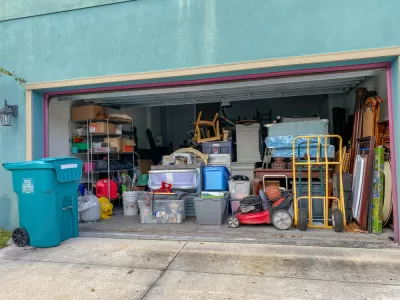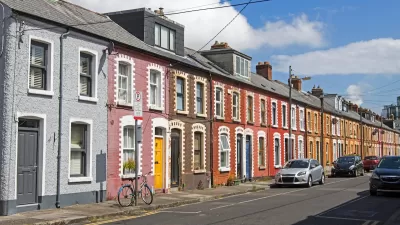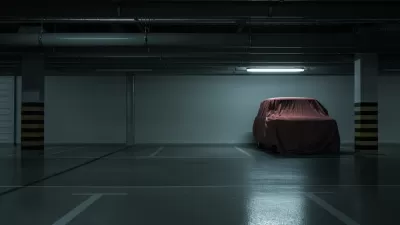With curbside parking available for free in front of most American homes, residents with private garages often choose to utilize the space for household storage. Putting a price on street parking could change that.

“The government constructs, maintains and distributes free car storage space along the curb in front of almost every house,” asserts Catie Gould, and because of this readily available parking space in single-family neighborhoods, many Americans park their cars on the street and use their garages for other purposes.
“A survey of detached homeowners in Sacramento, California, published in February, showed that when there isn’t space enough for both storing a car and household items, the cars are the items that end up moving elsewhere. The survey found that 37 percent of homeowners didn’t store a single car in their garage.” Surveys from other cities show similar results. A long-range UCLA study “found that 3 of 4 households had too much stuff in their garage to park a car.”
According to Gould, “When storing a car on the curb is free, a garage isn’t necessarily a garage: it’s a great big walk-in closet.” So, Gould asks, “When there is so much evidence that people don’t reliably use private parking spaces to store their cars, why does nearly every city still require them to be built?” Gould explains that these requirements can have a negative impact on housing affordability. “Mandates for off-street parking spaces raise housing costs and prevent housing from being built in the first place.”
Using an example from Vancouver, British Columbia, Gould argues that cities should price curb spaces to incentivize residents to park in their own garages or driveways and free up curbside space for public parking or other uses.
FULL STORY: One in Three Garages Has No Car in It

Planetizen Federal Action Tracker
A weekly monitor of how Trump’s orders and actions are impacting planners and planning in America.

Restaurant Patios Were a Pandemic Win — Why Were They so Hard to Keep?
Social distancing requirements and changes in travel patterns prompted cities to pilot new uses for street and sidewalk space. Then it got complicated.

Map: Where Senate Republicans Want to Sell Your Public Lands
For public land advocates, the Senate Republicans’ proposal to sell millions of acres of public land in the West is “the biggest fight of their careers.”

Maui's Vacation Rental Debate Turns Ugly
Verbal attacks, misinformation campaigns and fistfights plague a high-stakes debate to convert thousands of vacation rentals into long-term housing.

San Francisco Suspends Traffic Calming Amidst Record Deaths
Citing “a challenging fiscal landscape,” the city will cease the program on the heels of 42 traffic deaths, including 24 pedestrians.

California Homeless Arrests, Citations Spike After Ruling
An investigation reveals that anti-homeless actions increased up to 500% after Grants Pass v. Johnson — even in cities claiming no policy change.
Urban Design for Planners 1: Software Tools
This six-course series explores essential urban design concepts using open source software and equips planners with the tools they need to participate fully in the urban design process.
Planning for Universal Design
Learn the tools for implementing Universal Design in planning regulations.
Heyer Gruel & Associates PA
JM Goldson LLC
Custer County Colorado
City of Camden Redevelopment Agency
City of Astoria
Transportation Research & Education Center (TREC) at Portland State University
Camden Redevelopment Agency
City of Claremont
Municipality of Princeton (NJ)





























